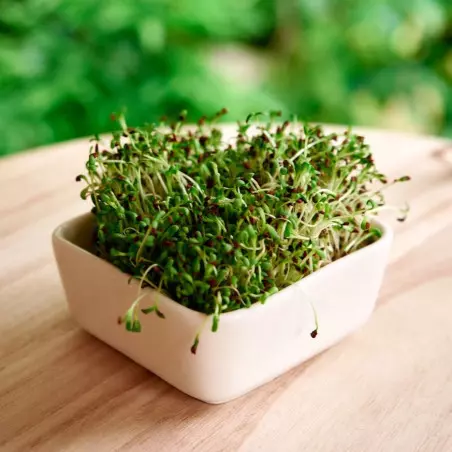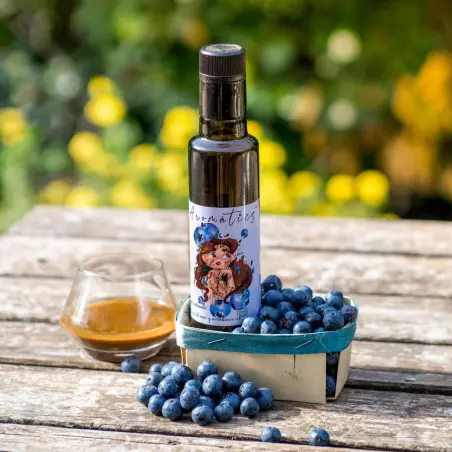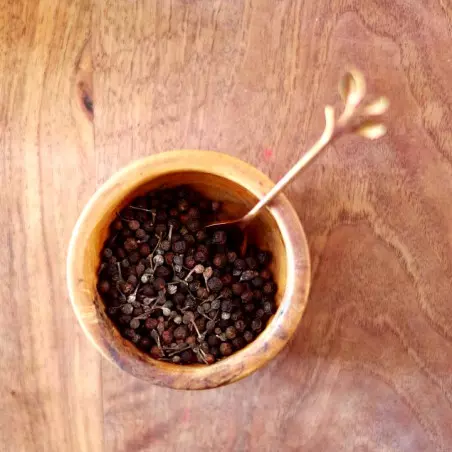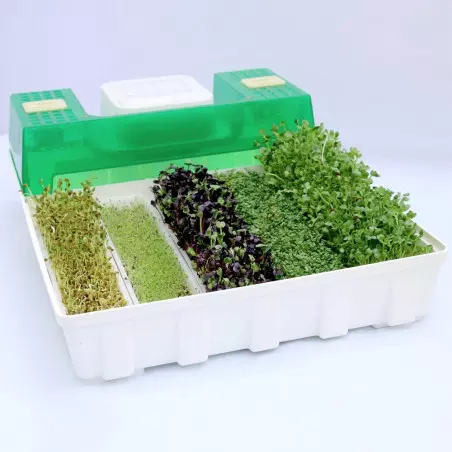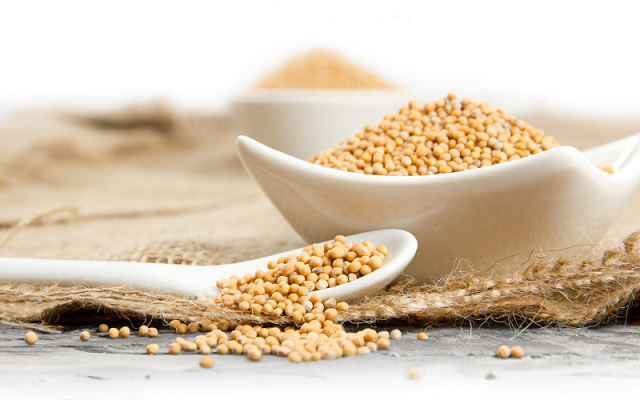"La" seed of mustard It is a tiny condiment with great virtues, used for millennia for its unique flavor that it imparts to various dishes, and for its numerous health benefits. This small seed is an important source of minerals, vitamins, antioxidants, and that's not all! (I'll leave a bit of suspense for the rest of the article). It is spicy and a powerful ally for overall well-being.
Without further ado, in this article, we will explore the multiple health benefits of mustard seeds as well as their various advantages, and we will offer you a simple and delicious recipe to incorporate this versatile ingredient into your daily diet.
Where does the mustard seed come from ?
The mustard seed comes from various plants of the genus Brassica "and" Sinapis, which belong to the Brassicaceae family, also known as the crucifer family. These plants, generally small and capable of reaching a few meters in height, are distinguished by their yellow flowers. They can grow in various climates but prefer cooler temperatures.
Mustard seeds are round and very small, not exceeding 2mm in diameter. Regarding the different varieties of mustard, there are 3 types:
Yellow mustardSinapis albaIt seems like your message is incomplete. Could you please provide the full text you would like translated from French to English? Also called white mustard. This variety produces seeds that are light yellow to beige in color. Its flavor is less pungent than other types of mustard and it is often used to prepare mild American mustard.
Brown mustardBrassica junceaIt seems like your message is incomplete. Could you please provide the full text you would like translated from French to English? The seeds of this type are dark brown in color and have a spicier flavor than yellow mustard. They are used in Indian cuisine and to prepare Dijon mustard.
Black mustardBrassica nigraIt seems like your message is incomplete. Could you please provide the full text you would like translated from French to English? The black mustard seed is the spiciest of the mustards. It is used in Indian cuisine and for making strong mustards in Europe.
These three varieties of mustard are used both as a spice and as a preservative in many cuisines around the world. When the seeds are crushed, they release oil and a characteristic pungent flavor, which is ideal for preparing condiments such as mustard paste or sauce, and very beneficial for the body due to the various medicinal properties of these seeds.
Homemade Mustard Recipe
Here is a simple and easy recipe to make your own mustard at home:
Ingredients:
- 100 g of seeds of mustard (mix of yellow and brown seeds for added complexity)
- 120 ml of apple cider vinegar flavored with Mango, ", or to the" blueberry "or to the" Raspberry
- 100 ml of water
- 1 tablespoon of honey or sugar (optional, for sweetness)
- 1 teaspoon of salt
- Spices of your choiceturmeric, garlic powder, pepper, paprika, etc.)
Instructions:
- Regarding the preparation of seeds: If you prefer a milder mustard, soak the seeds in the vinegar and water mixture overnight. This will help to soften the seeds and reduce their spiciness. If you prefer a stronger mustard, you can reduce the soaking time or even skip this step entirely.
- Place the soaked mustard seeds (along with the soaking liquid) into a blender, add the other ingredients, and blend until you achieve the desired consistency. If you prefer a smoother mustard, continue blending for a longer time, and for a more rustic, old-fashioned mustard, blend for a shorter time.
- Taste your mustard and adjust the salt, honey/sugar, or spices according to your personal preferences.
- Transfer the mustard into a glass jar and let it rest in the refrigerator for at least 48 hours before using it. This resting period will allow the flavors to fully develop.
- Your homemade mustard can be stored in the refrigerator for several months.
This homemade mustard will be perfect for accompanying your dishes, dressings, or as a base for other sauces.
The benefits of mustard seeds
It looks like your text is incomplete. Could you please provide the full sentence or additional context so I can give you an accurate translation? mustard offer numerous health benefits, thanks to their rich nutritional composition and bioactive properties, namely:
- Rich in nutrients: Mustard seeds are a good source of several essential nutrients, including B vitamins such as niacin (vitamin B3), riboflavin (vitamin B2), thiamine (vitamin B1), and folic acid (vitamin B9). These vitamins play an essential role in metabolic function and nervous health. Additionally, vitamin C present in mustard seeds, contributes to the strengthening of the immune defenses. Mustard seeds are very nutritious because they contain a high content of minerals such as selenium, magnesium, and calcium. They are also very rich in fiber and protein, which are essential elements for tissue repair. Mustard seeds thus have their rightful place in a balanced diet !
- Anti-inflammatory and antibacterial properties: Mustard seeds contain Sinigrin, a specific glucosinolate present in the seeds, particularly concentrated in the black and brown varieties. It is transformed into allyl isothiocyanates during chewing or digestion. Studies have demonstrated that it is a bioactive compound known for its anti-inflammatory and antibacterial properties. It can therefore help reduce chronic inflammation and prevent certain associated diseases, such as cardiovascular diseases, and can help fight bacterial infections.
- Anticancer effects: Thanks to sinigrin once again, mustard seeds show protective potential against the development of cancer. As demonstrated by the previous study, they could help inhibit the growth of cancer cells and protect against certain forms of cancer.
- Antioxidant action: The antioxidant activity of mustard seeds represents another key advantage, making them an excellent source of glucosinolates. The antioxidant properties of these compounds have been demonstrated and are essential for neutralizing harmful free radicals in the body. These free radicals can damage cells, cause premature aging, and contribute to various health problems. By incorporating mustard seeds into your diet, you can help protect cells against oxidative stress and the harmful effects of free radicals.
- Stimulation of digestion: Mustard stimulates the secretion of saliva and gastric juices, which can help break down food more efficiently, potentially improving digestion. These seeds also contain dietary fibers, which play an essential role in digestion. Indeed, fibers help to increase stool volume and promote regular bowel movements, while also feeding beneficial bacteria in the colon, which is very important for maintaining a healthy gut microbiome.
- Support for respiratory health: Historically, mustard seeds have been used for centuries in traditional medicine, particularly in the form of a poultice made from these seeds, to treat respiratory conditions. . A study explored how allyl isothiocyanate, a component found in certain plants like mustard, could help treat allergic asthma caused by dust mites. This compound reduces inflammation and improves lung function by decreasing inflammation and strengthening the connections between lung cells. This could make the compound useful as a complementary treatment for asthma.
- Benefits for the skin: Thanks to its anti-inflammatory properties, mustard seeds can reduce inflammation and redness, which can be useful for skin conditions such as eczema or psoriasis. These seeds can sometimes be used in poultices to relieve muscle pain and stiffness.
Note: It is important to note that, despite these various health benefits, mustard seeds should be consumed in moderation and without excess, as they are very potent and can irritate the digestive tract or skin. It is advisable to consult a healthcare professional before incorporating mustard seeds into your diet for regular consumption, especially if you have specific health concerns.
Germination of mustard seeds
The germination of mustard seeds is a simple and easy process that you can carry out in the comfort of your home, especially if you use It seems like your message is incomplete. Could you please provide the full text you would like translated from French to English?'Easygreen Light "or the"Easygreen Sol. . The sprouted seeds are generally richer in nutrients and enzymes, which can promote better digestion and offer an improved nutritional profile.
To germinate your mustard seeds with the autonomous sprouter Easygreen Sol, follow these steps:
- Prepare the seeds and spread them in a thin layer on the germination tray.
- Add clear and filtered water to the tank. You can add a small amount ofsea water if you wish to have an intake of minerals.
- Set the timer by choosing the appropriate cap according to the desired watering frequency.
- Close the lid of the sprouter. The system will take care of regularly watering the seeds.
- Come back in 3 days to harvest your sprouts.
- Sprouted seeds can be stored in the refrigerator for a few days. Keep them in an airtight container to maintain their freshness.
This sprouter allows for the germination of all types of seeds without supervision, making it ideal for a healthy and continuous supply of sprouted seeds.
To germinate mustard seeds with the automatic sprouter Easygreen Light, follow the steps below:
- Place the sprouter on a stable surface and plug it into an electrical outlet.
- Evenly distribute the mustard seeds on the tray of the sprouter.
- Program the system to automate the watering and aeration of mustard seeds, which includes between 5 to 8 misting cycles daily, with a daily water consumption between 2 and 3 liters.
- Regularly check the water level to maintain consistent humidity.
- Mustard seeds generally germinate in a few days. Once they are ready, you can harvest them and use them fresh.
How to use mustard seeds in cooking ?
The mustard seeds are extremely versatile in the kitchen, bringing a tangy note and depth of flavor to various culinary preparations. For example, you can:
- Use mustard powder, obtained from ground mustard seeds, as a spice in various preparations such as marinades or vegetable dishes to give them a spicy flavor and even help tenderize the roots of vegetables.
- Use mustard seeds in condiments by grinding them and mixing them with vinegar, salt, and other spices to create homemade mustard.
- Sprinkle sprouted or lightly toasted mustard seeds on your salads to add crunch and a tangy flavor.
- Sprinkle mustard seeds on roasted or sautéed vegetables to enhance their flavor.
Mustard seeds are also a traditional addition in Indian pickles, pickled cucumbers, and other types of preserves, as they possess natural preservative properties. They also have the ability to add depth and spiciness to preserved vegetables, thereby enriching their taste and texture.
Conclusion
The mustard seeds thus constituting an essential and highly beneficial ingredient for health. Whether for their medicinal properties, their ability to enhance the flavor of various dishes, or their ease of use in diverse recipes (even the most complex ones), they offer a range of advantages for any cooking enthusiast. These small seeds add a depth and intensity of flavor that can transform an ordinary recipe into a memorable dish.. Their nutrient content helps promote health, making them a valuable addition to your diet. Using mustard seeds in cooking can not only expand your culinary skills but also enrich your diet in a delicious, healthy, and balanced way.



